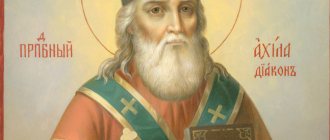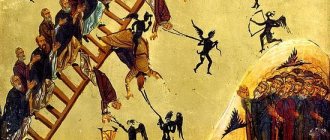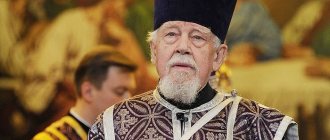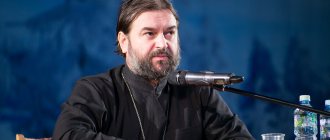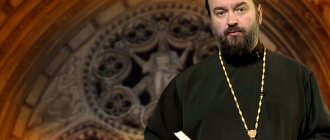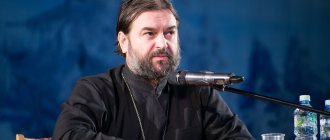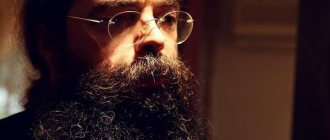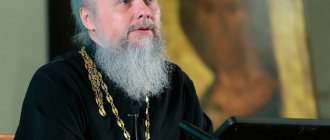Lorgus Andrey Vadimovich
1956
Russian Orthodox Church
Third generation of modernists
San: archpriest
Graduated from: Moscow State University, MDS
Taught at: Moscow State University, Russian State University, Diocesan missionary courses in Moscow
Organizations: Publishing Council of the Russian Orthodox Church, Russian-Austrian Theological Dialogue on Christian Anthropology, Institute of Christian Psychology, European Movement for Christian Psychology and Anthropology, Russian Orthodoxy (foundation)
Press: Journal of the Moscow Patriarchate, Orthodoxy and Peace (Internet portal), Belarusian Exarchate (publishing house), Nicaea (publishing house), Pilgrim (publishing house), Sisterhood in the name of St. Ignatius of Stavropol, Neskuchny Garden (magazine)
Direction: Orthodox psychology
,
liberalism
,
immoralism
,
approval of the sin of Sodom
Modernism
(1956 - ) - representative of Orthodox psychology.
In 2022, he signed the “Letter of priests and laity to Christians of Belarus.”
hierarchy
In 1993, he was ordained as a priest and assigned to serve in the Temple of the Prophet Elijah the Ordinary.
He was also appointed rector of the Church of the Sovereign Icon of the Mother of God under construction in Chertanovo[1].
He is the founder of the home church of the Holy Martyr Tryphon at Psychoneurological Boarding School No. 30 and the Church of the Life-Giving Trinity in Chertanovo[2].
He served in the Church of St. Nicholas on the Three Mountains.
He has appeared on television several times. For his work, Andrei Vadimovich was awarded awards and various titles. Andrei Lorgus is also the author of several books about Christianity, a number of publications on the topic of the relationship between man and religion[1].
On May 25, 2022, he was removed from the temple for the staff (retirement), according to the submitted petition, with the right to participate in the services of the Church of St. Nicholas of Myra on the Three Mountains of Moscow, in agreement with the rector of the temple[3].
In our time, it seems to me that there is no longer any point in talking about the subordination of the family to a man, or repeating words from Domostroy[4].
In 2022, he signed the “Open Letter from Priests in Defense of Prisoners in the Moscow Case”[5].
Experiments of Archpriest Andrei Lorgus
He is well known not only as a brilliant preacher, but also as the author of many scientific works, radio host, screenwriter, practicing psychologist, teacher, and rector. Much less is known about how unusual the life of priest Andrei Lorgus was. Here's what he himself said about it.
5 facts about Father Andrei
His great-grandfather Archpriest Dimitry Bogoyavlensky, rector of the Trinity Church in Kupavna, was shot in Butovo in 1937.
In the early 2000s, priest Andrei Lorgus received a blessing to build a Trinity Church in Chertanovo in memory of his great-grandfather.
For many years he has been a member of the council of the European Movement for Christian Psychology and Anthropology, and regularly gives presentations there.
Author, co-author and compiler of 15 books about the Church and psychology.
Screenwriter and consultant for a number of documentaries about the Church.
Brutal education at the tundra school
I was born in Kolyma, where my geologist father worked at the mines. A few months later we left for Moscow. And in 1966, when I was 10 years old, we moved to Chukotka, where my dad became the chief geologist of the mine. I graduated from school there. And he started working there. This is a very important life experience for me. I grew up in nature, in the tundra. I had a brutal upbringing - a hunter, fisherman, tracker, naturalist. Dad got me a children's gun, which was converted from an adult one. And for me, a ten-year-old Moscow boy, getting a real hunting rifle according to my height and hand size was fantastic. Tundra school gave me a lot to develop endurance and resourcefulness.
After school I went to work in a mine. First as a mechanic, a bulldozer operator, then as a miner in an artel. My father and I received permission to privately mine gold. They were called freemen. In the summer, gold was mined little by little and everything was handed over to the state. If you keep even a grain for yourself, you will be punished by prison or even execution.
At 17–18 years old, I had a tremendous and varied experience. I learned to work: I mastered the control of a tractor, a bulldozer, a diesel engine, a pump, and could repair them. But I also learned to drink, since alcoholism was almost universal there.
Marry to save yourself
At the age of 18, I returned to Moscow to prepare for the army. Even in Chukotka, I wanted to join the marine fleet, but they didn’t take me for health reasons. It didn’t work out in Moscow either. And I began to work in the Pravda printing house, where my mother worked. The pay there was good, but the work was hard, and I ended up in the hospital with an ulcer. Here my life turned around thanks to the doctor Margarita Alekseevna Ado, a well-known hematologist in Moscow. She told me:
- Why do you need such a life? You will destroy yourself. You need to get married and go to college.
These words sank into my soul. I didn’t immediately run to get married and go to college, but I began to get out of a difficult situation in my life. I quit drinking and found an easier job: I became a laboratory assistant at an institute. There he met his future wife. And after some time, on the advice of one wise professor, he entered the psychology department of Moscow State University.
In my 3rd year at university, I converted to Christianity. Little by little this started a long time ago. While still at school, I read the Gospel left over from my grandmother. I had a classmate with whom we talked about faith. And once he told me:
- Where can I put it aside? You need to be baptized.
I had just gotten married then and loved my wife and our little daughter very much. But love and the meaning of life for me were connected with God. If there is no love, and instead of it there are hormones, flesh and social conventions, then there is no life, no God, then everything has no meaning. And for me the answer to the question: “Do I believe?” was an unequivocal “Yes.”
When news of my baptism became known, we were almost kicked out of the university for it. But from that moment on, I could openly go to church.
Man is not a machine or a monkey
After graduating from university, although I had a good diploma, I did not want to stay in my specialty, because then psychology was materialistic and inhumane. On the one hand, a person was considered as a set of functions, and on the other hand, he was understood as an animal. A person is uncomfortable in such a psychology. It was hard for a believer to do this. And my confessor, rector of the Church of the Sign at the Rizhsky station, Father Vladimir Rozhkov, told me: “Come to us as a watchman.”
I was released from distribution at my request. It was a miracle, because back then you had to work for three years. And for six years he worked in the temple as a watchman and janitor.
Then a revolution took place in my mind. I came to the church world where I say what I think and do what I think is useful. And in 1988 I was ordained as a deacon. I began to serve in the Church of St. Nicholas in Kuznetsy. In the early 1990s, we carried humanitarian aid for patients at psychoneurological boarding school No. 30 in Chertanovo; there were years of famine. The boarding school already had a prayer room. And the staff once turned to me: “Let’s open a temple here.” The director of the boarding school wrote a letter to Patriarch Alexy II, to which I attached my application for the priesthood. So at the end of 1993 I became a priest. The temple was equipped with their own money.
One day, a professor at the Moscow Theological Academy, Alexei Ivanovich Sidorov, asked if I would like to teach Christian psychology at the Russian Orthodox University?
But Christian psychology as such did not exist in our country at that time. I had to formulate for myself what it is, to understand on what foundations it can be built, in contrast to materialistic psychology. And six years later, with the help of Moscow University, we opened the country’s first department of Christian psychology at the Russian Orthodox University in 2002. And in 2010, they created a separate Institute of Christian Psychology, where I became the rector.
So after many years I was able to study psychology again, and it no longer contradicted my faith. After all, Christianity brought into psychology love for a person who is not a machine or a monkey.
views
approval of the sin of Sodom
There are other situations when a person comes to a pastoral conversation and confesses that he has a same-sex partner. He understands that he cannot begin the Sacraments, but is not ready to change his lifestyle. In any case, the non-judgmental position of the pastor is very important. Many priests are extremely aggressive towards this sin, but it is necessary that the pastor has compassion for people who admit it. This should not be pity, but rather compassion based on respect for the individual[6].
authoritative authors
Dostoevsky Fyodor Mikhailovich • Florensky Pavel Alexandrovich.
Institute of Orthodox Psychology
A new and good thing was that Andrei Lorgus founded the Institute of Orthodox Psychology in 2009. This was the first educational institution of this type in Russia. In this place, anyone could receive additional education, and not always spiritual education. The priest himself has the post of rector there; he regularly gives lectures about Christianity and its connection with ordinary human life.
Interesting! The archpriest received several honorary awards for his service. Andrei Vladimirovich himself has appeared on television more than once. In addition, the priest provides online counseling. He says this is not just his job, but his service.
pathological speech
Existential
- There are two fundamental facts in both services: I serve a person and I myself am a person; I serve the salvation of the soul and I myself need the saving power of the Church; I serve the construction of a god-like personality and I build my own; Finally, I teach and am a student myself. In this existential duality,
I see only one path of integrity and chastity. This path is personality[7].
positive
- The generation (those born after 1985 - Ed.) wants to live positively, enjoy life, wants to increase this life, believe in simple civic and social benefits and build their lives not on the basis of suffering and survival, but on the basis of far-reaching life strategies. And without positivity,
such strategies cannot be formed.
Positivity
, love of life, resilience are directly related to the emotional and spiritual state of happiness[8].
vocation
- There is still a question about the priest-psychologist. Is it possible to combine these two callings
in one ministry?[9]
speculation
- The Eucharist reveals to us not only speculatively
, but also actively the path of communion of our body and flesh with His Body and Flesh[10].
The Holy Fathers do not have thought forms
- The question of the composition of the human being has not yet been resolved unambiguously[10].
pathological vocabulary
Abstract, Theological, Existential, Comprehensive, Comprehensive, Grandiose, Cheerful, Programmed, Consolidated, Personality, Obscurantist, Community, Object, Revelation, Revelation of man, Discovery, Paradigm, Pneumatological, Pneumatology, In a new way, Vocation, Separation, Role-playing, Freedom of the Church, Free Man, Meaning, Strategy, Subject, Tragic, Speculative, Success, Integrity, Existential
Confession is a risk zone for a pastor
Willingness to serve people is a readiness for the personality of the priest to meet the personality of the penitent. Everything begins with such a meeting - relationships, trust, spiritual path, spiritual guidance. But at the heart of it all is the special relationship of the priest to the person. This is the attitude of a teacher, father, friend, judge and defender at the same time. But priestly service is not limited to this, there is the main thing - and it is mysterious and inspired. To become the one who stands for the Church and God for a person, it is necessary to absorb into the soul and consciousness everything that has been accumulated by the spiritual experience of the fathers and traditions. However, the modern practice of life support (a term replacing “psychotherapy”) can also provide considerable assistance in this regard.
Shadow of healthy doubt
First of all, not everything that is said in confession can be taken on faith. People may not always be adequate. It is important to set yourself the task of separating what is relevant to confession from what is subject to doubt. But the priest cannot always quickly understand and sort out what is and what is not related to confession, what is reliable and what is not, but the priest always needs a shadow of healthy doubt. Not at all out of a presumption of mistrust of the penitent, but out of healthy caution. The task is to ask again, to make sure: we are talking about sin or we are talking about doubt, we are talking about some kind of dubious identification of a plan, an act, a thought. And this requires, of course, an attentive attitude towards the repentant. When this question comes from experience, then it is much easier, but it is very difficult for a novice priest to separate one from the other. That is, here healthy doubt is truly necessary.
It must be said that the questions themselves and the auxiliary conversation at confession are necessary in order to clarify, clarify whether it is a sin or not a sin, we are talking about an act that has been committed or not.
Without details
During confession, the priest may hear circumstances under which the sin was committed that may shock him. Therefore, it is necessary to ask the penitent to avoid details unless they are relevant to the specific qualification of the sin. First of all, this concerns the topic of carnal sins. There are physiological details that may or may not qualify as sin. The main criterion in such qualification is what is subject to a person’s control and what is not.
For example, a young man who suffers from mental illness says: “I try never to cough at work, but when I think about it, I immediately have the urge to cough. And I have to run out of the temple into the street to clear my throat, breathe, calm down, and then come back.” This is a purely psychosomatic phenomenon, and it does not have any sinful composition. This is not a sin, although a person may think so.
Another example is that a woman suffers from the fact that she often loudly passes air from her stomach. She also experiences psychosomatic nervous tension; she tries not to think about it during work in order to avoid an unpleasant moment. When she feels air pushing up her esophagus, she tries to fight it. The fight fails, the woman loses patience, begins to panic, the condition worsens, and she runs out of the temple. She believes that this is a sin and is very tormented by it. And I believe that in this case, the priest, again avoiding details, should always reassure the person and figure out whether this is a sin.
Sin is only something that a person knew about and could have avoided, but did not do so. And then there is a certain arbitrariness in this, a certain inattention to oneself. But when understanding this, you need to be very delicate. And only if there is a feeling that there is enough love, calmness and a benevolent attitude towards a person to clarify this, you can dive into these details. If not, it's best to avoid it.
Hysteria interferes with repentance
Often a priest encounters tears and hysterics during confession, which may turn out to be just defense mechanisms. In what cases are tears not repentance for sin, but a neurotic reaction? First of all, when a person habitually uses the victim model for himself in relationships with people, in our case in relationships with a priest. The victim model is a personal position in which a person perceives himself in advance as unhappy, offended, punished by someone, and believes that he is the victim of some kind of conspiracy or intrigue. Of course, more often these are women, but not only. Men also resort to this unconscious pattern of behavior. Victims have a lot of secondary benefits, as psychologists say. There is less demand on the victim, she is punished less, and the victim is treated with more compassion. Therefore, tears in this position can be a defense mechanism from the fear of punishment, from the fear of disrespect or contempt, but not tears of repentance.
If a priest perceives tears as a signal to console and justify a person, then he thereby moves the person away from confession and prevents him from focusing on repentance. If tears are a defense mechanism, then the best position of the priest is to exclude any spiritual participation in these tears. It is very important. Hysterics, of course, rarely happen in confession, but nevertheless, people prone to hysterical behavior can demonstrate such behavior. Hysteria can begin with sobbing, frequent sighs, rolling eyes, wringing hands, scratching them, and be accompanied by intermittent speech, memory loss, fainting, dizziness, and nausea. We need to understand the reason for this hysteria. A healthy hysteria always has some very important emotional reason. Either this is some kind of shock or panic. If this is a habitual hysterical behavior in confession for a person, then we can say that this is also in the nature of a defense mechanism. In this case, the best pragmatic position of the priest is to avoid emotional issues and try to move the penitent, push him to a drier presentation of events, without going into details.
These details are just what get in the way. If the penitent begins to shake himself emotionally, you can even go so far as to pause confession and say: “Please stand aside for now, wait, and then I will call you.” It will be enough to let two or three people through so that the confessor calms down, and the hysteria does not develop into its full clinical manifestation and subsides. Then you can continue the confession from the next point. In other words, it is easier to stop a hysteria than to calm it down later. And most importantly: hysteria does not push a person to repentance, does not give him a repentant mood, but, on the contrary, interferes.
Cynicism is one of the signs of priest burnout
When a person repents of serious sins - abortion, adultery, drunkenness, drug addiction, then maximum love is required from the priest at that moment. Love not in the sense that one must love the confessor as a friend, as a wife, as children, as a mother, but love in the form of unconditional benevolence and unconditional acceptance of the repentant person. If there is no such mood at this moment, then it is better for the priest to avoid confession in this state. And if there is no such possibility, then limit yourself to an almost formal attitude towards the fulfillment of your liturgical duty. Yes, this is an extreme case, but I think that for a priest such a formal performance of duty is possible if it is otherwise impossible to fulfill this duty. But a formal performance of the service is better than a cynical one.
Cynicism is one of those states that a priest should certainly avoid. Cynicism is already contempt, this is already pride before the confessor. This is truly an internal, heartfelt sin of the priest, which is disgusting to the Lord. Very often, cynicism is an element of the general syndrome that we call burnout. A “burnt out” priest is prone to cynicism, and because of this he lacks love, sympathy, compassion, empathy, co-presence here and now with a person. All those qualities that underlie priestly ministry.
Double liability for fear
It is very important to understand that during confession a person is at risk, that is, he removes all defense mechanisms and becomes, as it were, “undressed.” And indeed, a repentant person removes layer by layer of external guises, masks, social roles, so that his conscience, his true conscience, the one that evaluates sins and non-sins, can realize its voice and the person repents. At this moment, a person is very susceptible to affect, panic, a feeling of failure, and traumatization. Therefore, the words of a priest sometimes, even if spoken with love, can traumatize a person. For example, if a priest tells a penitent about the norm of penance and the attitude of the Church to his act, which lie at the basis of penitential practice, that is, those very strict canonical rules regarding grave sins. Or the priest can express condemnation of an act in an uncompromising and, therefore, partly harsh form, to which a person is not accustomed - due to his upbringing, due to his, perhaps, initial neophyte state in the Church. Since at this moment a person cannot defend himself and there is no one else to support him, the words of the priest and the situation of confession itself can be a very serious injury and trauma. Yes, if this happens, it is not necessarily the fault of the priest, but the fault of the priest will be if he did not worry about some kind of safety zone for the penitent in advance. Liturgical responsibility does not include the concept of a person’s safety in worship, including in confession, but conscience can also be helped by the priest thinking about how it feels now for a person standing here, in front of the cross and the Gospel, to feel at trial - his own trial , the court of the listening priest and, finally, the Court of the Lord.
Yes, repentance is a very difficult experience. But it’s not worth adding another mental wound to this if there is no urgent need for it. What could be the need for this? It can only happen if a person refuses to accept sin for sin, persists in this, and perhaps the priest feels that the penitent does not want to admit the sin he has committed and all its gravity. I know that some priests, feeling unrepentant stubbornness and stubbornness, petrified insensibility, proceed to intimidate a person. And they achieve quite a lot of success in this, because they certainly have experience in this. It is enough to simply bring together the words of the Gospel and the canons of the Church, arrange them in a certain scheme, and this can frighten anyone. I saw how government officials get scared during confession, how the police get scared, how bandits get scared, how notorious alcoholics and debauchees get scared if only the priest unfolds his repentant sermon in front of them. Yes, sometimes a threatening sermon is important, but the responsibility for this fear must be special and double. And we, priests, will be responsible before the Lord for this.
Credit of trust
It is important to understand that the penitent has a certain trust in the priest. This trust appears to be a precondition with which a person comes. That is, a person comes to you, he chose you. Maybe it was a coincidence, he thinks, maybe he chose from several priests he had observed for some time. Anyway, he approached you. Before this, he prepared, listened to his conscience, maybe argued with it for a long time, thought about it, maybe he was disingenuous, and maybe he deeply repented in a moment of sincerity. One way or another, having come and begun confession before Christ in your presence, the penitent has done a lot of work, which includes the fact that he is here and now standing before you. This is his credit of trust, but this credit is not endless. Therefore, a person will not always tolerate mistakes, indifference, cynicism, misunderstanding or even a reluctance to understand. This credit can be used in one confession. But it is important to remember that this trust is a real internal resource of the person with whom he comes to the priest.
Prohibited questions
One of the most difficult topics in confession is the topic of carnal sins: infidelity, affairs outside of marriage, etc. It requires special delicacy. It is very important to understand that the temptation for the priest here is great. The priest is a man, and therefore any confession of women on this topic is always a super-tense meeting. It is very important to remember that a woman coming to confession is a woman coming to a man, and what she would never want to tell anyone, she tells the priest. In order for this confession to be a confession before God, it is important for the priest to become the guardian of his own heart in order to prevent temptation from the woman’s sincerity.
What are the priest's temptations here? The very first and most superficial thing is curiosity. Delve into the details of the sins of a woman, girl, girl or child. The best position of the priest here is a clear boundary, which should be immediately defined, without allowing either himself or the repentant woman to get into details. If a woman says: “I repent of having committed some carnal excesses,” that is enough. If it's cheating on your husband, then it's cheating on your husband. How, when, with whom, how much are prohibited questions. It is quite possible that a young priest, a young man, will be tempted to ask one of these questions. Perhaps at this moment it will seem to him that this is very important, but this is the wrong way. The priest must not only be extremely careful, but also hold his tongue and accept confession, and not understand what is happening to the woman. And it's none of his business.
If a man is confessing, then in this case, of course, the temptation is fundamentally different and much less. But you need to understand that a man’s stories also need to be treated with special caution. For many men, stories about their sins can be bravado, a desire to show how highly a man places himself in this sense. Even if he repents, he can tell with some inner contentment that he is a ladies' man and a Casanova. What is required here, perhaps, is more clarity, rigor, and dryness—without additional questioning. Yes, of course, men are more careful, strict and, as a rule, taciturn in confession. Women can also be taciturn, because they are very ashamed to tell a male priest about their sins, but there are some neurotic states when a woman strives for this verbosity and wants to tell details. This must be stopped right away and said that there is no place for details and any other clarifications here. Only repentance and prayer.
Cross Confessions
There are several other temptations that a young priest may encounter. These are joint confessions or cross confessions, when husband and wife, man and woman come to the same priest, try to agree on the topic of their confession with each other and check how well the priest matches their plan, whether they managed to draw the priest into this conversation. This must be resisted in every possible way and such situations must be avoided. Confidentiality concerns not only the priest, it also concerns those confessing, therefore there can be no transition of events from one to another. The priest cannot tell the husband anything about his wife’s confession, and the wife nothing about her husband’s confession. This situation should not be allowed, even if this couple is not yet in a marital relationship.
The imposition of penances on carnal themes is entirely on the conscience of the priest. In today's situation, when a huge number of young couples live with each other, changing partners without any kind of marriage contract, registration or wedding, the conscience of the priest is constantly challenged.
However, one should be aware that the moral norms of Christianity, reflected including in the church canons, are enduring, despite the many violators.
ZhMP
essays
- Deacon Andrey Lorgus
. Church and museum.// Creativity. zhur. - No. 1 (409) - 1991. - M.: Soviet artist. - Deacon Andrey Lorgus
. To Caesar what is Caesar's. Historical apology.// Journal of the Moscow Patriarchate. - 1992. - No. 11-12. - Deacon Andrey Lorgus
. A king of shepherds. Sermon. // Journal of the Moscow Patriarchate. - 1993. - No. 1. - Priest Andrei Lorgus, priest Mikhail Dudko and others.
A book about the Church.
- M.: Pilgrim, 1997. Priest Andrei Lorgus, priest Mikhail Dudko and others.
A book about the Church. — Rev. and additional - M.: Pilgrim, 1998. - The same, 3rd ed. – 2000,
- The same, 4th ed. – 2004,
- The same, 5th ed. – 2005,
- The same, 6th ed. – 2008
Dudko Michail. Orthodoxes Glaubensbuch. Eine Einfuhrung in das Glaubens – und gebetsleben der Russissischen Orthodoxen Kirche. Verlag “Der Christliche osten”?. — Wurzburg, 2001. (German edition of the Book of the Church)
Formation and correction of the image of God in the consciousness of a Christian. // Moscow psychotherapeutic journal, Special issue on Christian psychology. - 2000. - No. 2. - M.: MGPPU PC.
Adam and Eve - the perfection of humanity // Collection of articles of the Interregional scientific and practical conference “Astrakhan diocese and the spiritual revival of Russia”. - Astrakhan, 2002.
Soul and spirit: nature and being // Teaching of the Church about man. Theological conference of the Russian Orthodox Church. Moscow, November 5-8, 2001. Materials. - M.: Synodal Theological Commission, 2003.
Orthodox teaching on personality // The significance of Christian anthropology in the face of modern social tasks and problems. Materials of the Russian-Austrian Theological Conference on Christian Anthropology. - M.: Indrik, 2003.
Anthropological crisis of Russian society // The significance of Christian anthropology in the face of modern social tasks and problems. Materials of the Russian-Austrian Theological Conference on Christian Anthropology / Comp. And Lorgus. - M.: Indrik, 2003.
Orthodox anthropology. Lecture course. Issue 1. - M.: Graf-press, 2003.
Personality of man in the light of Orthodox teaching // “The spiritual world of man on the threshold of the third millennium”, collection of articles. reports of the scientific and methodological seminar. MIIT, Department of Theology. - M.: MIIT, 2003.
Mental illness does not take away faith. Interview.// Mercy.ru. - 2004. - May 21.
War is the triumph of hatred. // Continent. - 2004. - No. 122. - M.: Continent.
At the reception with the pastor. (Pastoration and psychotherapy - original title).// NG-Religions. - 2005. - No. 11(163), July 13.
The death penalty - pros and cons. Theological and church-practical arguments // Human life in the face of death. Materials of the II Russian-Austrian Theological Conference on Christian Anthropology / Comp. And Lorgus. - M.: Indrik, 2006.
Soul as a psychological category // Bulletin of PSTGU. Series IV: “Pedagogy. Psychology". Vol. 2.. - M.: Orthodox St. Tikhon's Humanitarian University, 2006.
Christian psychology in the space of the humanitarian paradigm.// Moscow psychotherapeutic journal, Special issue on Christian psychology. - 2006. - No. 3.
Psychology - with or without religion? // Psychology. Journal of the Higher School of Economics. - M.: 2007. - vol. 4. - No. 2. - p. 58–64.
Reflections after reading the book... // Vladeta Erotich. Christianity and human psychological problems. - M.: Publishing Council of the Russian Orthodox Church, 2009.
Category of personality in Christian psychology.//Counseling psychology and psychotherapy. Special Issue on Christian Psychology. M,: MGPPU PC. - 2010. - No. 3.
Guilt and sin. //Counseling psychology and psychotherapy. Special Issue on Christian Psychology. - 2010. - No. 3.
Psychological assistance and spiritual support for people living with HIV and their loved ones. - M.: Russian Round Table, 2012.
Prevention of burnout syndrome among specialists and volunteers working with people living with HIV. - M.: Russian Round Table, 2012.
(2013): Why homosexuals are not born // Neskuchny Sad. — 2013. — May 6. — checked on 6/5/2013.
The Church is not only a hospital
“Orthodox psychologist” is a fashionable profession today. But there are not many specialists who can call themselves that. The famous priest Andrei Lorgus was lucky: he has a psychological education, which turned out to be in great demand in his pastoral practice. Father Andrei spoke to the Pravoslavie.ru portal about how to overcome the consumerist attitude towards the Church and separate psychological and spiritual problems.
***
| Priest Andrey Lorgus |
– Many people come to the temple when they are faced with some difficult life situation.
Can and should the Church help? – It’s true, not all believers come to church: this is a certain contingent that has trust in the Church, trust in the priest. At best, there are 5–10 percent of such people in our society. They come, and many of them really count on the Church and the priest to solve all their problems. And here you need to act very carefully so that, on the one hand, not to deceive them, not to feed their illusions, and on the other hand, not to push them away.
Our psychological culture as a whole is very low, since it has not developed for many decades. After all, a society in which the main culture of relationships was ideology does not know how to correlate its problems with the capabilities of each other: its loved ones and those people who are around. For example, previously the main way for the intelligentsia to solve their psychological difficulties was to drink tea at night in the kitchen. For a male group - have a drink together, for a female group - chat with friends...
– But such confidential communication is not the worst way to solve your problems - much better than going out into the street with an ax or coming to school with a weapon.
– He’s not the worst, but he’s not professional. Unfortunately, it can cause harm, as, for example, unprofessional medical advice is fraught with various troubles. And then, sometimes it’s a pity that in church people are looking for this kind of confidential communication; they do not come to pray, and therefore do not receive what they could have received. They could have the joy of fellowship with God. But many people don’t see this and don’t know - they come because a child is sick or they dream about a dead grandmother at night.
Often people turn to church expecting an Orthodox psychologist in order to avoid going to a psychiatrist, because psychiatry in our society is something shameful, a stigma for life, and a mentally ill person is an outcast in society. Mothers very often trigger a child’s illness, only to avoid admitting to themselves that he is mentally ill.
– After all, there are cases when love, humility and prayer managed to heal a person. Many mothers think that they can beg their child...
– If you start a disease, then very often nothing can be done. You need to go to the doctor and take medicine. Miracles have not been canceled, but these are still exceptional cases.
– What should a priest advise in this situation?
– A priest must have basic psychological literacy. He must also know what mental illnesses there are and what their symptoms are. He must recognize the disease as a disease, and not try to treat it with frequent communion, reprimands or prayers. For example, with schizophrenia or borderline states, you cannot burden a person with strict fasting - this worsens his condition. A competent priest will refer you to a doctor and, together with the specialist and the patient himself, will strive to improve his condition.
– How to distinguish: a person’s problem is spiritual or mental?
– There are mental health problems. These are diseases: psychoses, neuroses and others, they need to be treated. The church can help a person, it can promote healing, but the priest is not a healer and does not cure diseases. I have had such cases that even if, for example, they have a headache, they go to the priest, counting on some kind of magical help.
– It is believed that churchgoers are less susceptible to depression and neuroses. Is it so?
- Against. People who suffer from some kind of internal problems more often turn to their inner world, more often seek God, they are internally attentive to themselves. Therefore, unfortunately, those who experience difficulties with their health often come to Church.
Typically, those who are extremely healthy think less about themselves. Therefore, in my opinion, in the Church there are more often people with psychological difficulties, and this is correct, because the Church is a hospital. The trouble is that people come to church not to pray, but to solve their problems. Such a mercantile attitude: You - to me, I - to You - is regrettable. Of course, the Church is also a hospital. But not only. This is not its essence, not in the first place. The church can be called a hospital of the spirit, but not a hospital of the psyche. This needs to be differentiated.
– When becoming a church member, many encounter difficulties of a psychological nature, because life in the Church is built according to different laws than the life of modern secular society. Is it possible to describe from the point of view of a psychologist what a person experiences as he gradually joins the life of the Church?
– If a person enters the Church, then he will most likely encounter a phenomenon called neophyte. This is an almost obligatory period, we all experienced it, since we ourselves became churchgoers at a conscious age. Neophyteism has its own symptoms, its own age, its own timing. This is what every new convert goes through. This phenomenon has been known for a very long time, and it is well described in the literature. You can read and watch if you wish.
The main thing that a neophyte must know is that he is a neophyte. And in the parish, the rector and all social and parish services, including the neophyte in their activities, must know that the neophyte may have categorical judgments, infantility, mental imbalance and instability. He still knows little and is excited, he is in euphoria. This is fine. This must be taken into account and not put pressure on the person, let him experience it.
When this stage passes, a more terrible thing comes, which is called a crisis. A crisis of faith, a crisis of churchliness, when disappointment and cooling come and a time of doubt comes. At this moment, the shepherd needs to be more attentive and attract such a person to study. Relearn faith again: read deeper books, learn to pray seriously, without miracles, without emotions, but more deeply.
The trouble is that the neophyte is visible, he advertises himself, he does everything demonstratively. And during a crisis of faith, a person is ashamed to show himself, because he evaluates himself as having lost faith, although in fact this is not the case. He didn't lose her.
We need help to survive the crisis. Because, being in this state, a person withdraws, he does not come to services, does not come to parish events, he secludes himself. It would be good to “get” him out of this solitude and attract him to community life - not just pull him by the hand, but offer him. This requires attention and a special approach on the part of the pastor. And psychology helps with this. In my practice there are many such cases.
Such crises of faith recur from time to time; there will be several of them. But the fact that they happen is not a bad thing; a crisis is a sign of development. If there is no crisis, this is a reason to think: what happens to a person? Three years have passed, and he is still a neophyte! This is already a sign of a personality disorder. This means that it is no longer a matter of faith, but of the psyche.
– How ready are priests to help their flock in overcoming such a crisis?
“But it happens that our priests are also neophytes.” So they are going through the same problems. They went through it and overcame it, that’s why they can help, and those who have not experienced a crisis themselves cannot help another. The main thing is to make this experience of going through a crisis a subject of reflection for yourself, your confessor and, perhaps, a whole group of people. When we discuss something together, we are interested, we feel better and we are not afraid. We understand that we are not alone in facing such problems, and this is nothing out of the ordinary. Which means I’m normal. It’s worth meeting and talking to two friends in misfortune, and it becomes easier for both. There is a need for parish work with people in crisis. You can hold meetings and seminars at the parish. And a priest who also went through this could be the leader of such groups. And if he hasn't been through it himself, then he can't do anything. He himself does not understand what the solution is.
– Is it possible for an Orthodox person to consult a psychologist?
– A psychologist does not treat. It helps the individual cope with his problems, but will not cure mental illness. If you need to solve a spiritual problem, you need to go to a priest. If it’s personal, family, marital, that is, what concerns building relationships, then it’s to a psychologist. For example, if a person suffers from an inescapable feeling of guilt, this needs to be resolved with a psychologist; if a person suffers from a feeling of sin and wants to repent, then it is to a priest. Sin is for confession, and the feeling of irrational guilt is for a psychologist, it has nothing to do with real sin, it is already a neurotic feeling.
Now that the Church has become actively involved in social work, it has become clear that, in addition to the need for spiritual pastoral care, there is a huge need for specialists - psychologists and psychiatrists. If there are no such specialists, then their functions have to be taken over by the priest who cares for this social institution. For example, in an orphanage - all the children there are problematic, already traumatized, since a child’s psyche can only develop normally in a family...
Personality problems, mental problems, communication problems cannot be solved by a priest, but he must know about the characteristics of those whom he cares for. Of course, an Orthodox psychologist could be his best assistant. But so far there are very few such specialists. There are many secular psychologists, but there are very few ready to work in the social services of the Church, and those who exist lack professional training. Therefore, it would be correct to train such specialists in Orthodox universities.
– Are there methods of psychology that are unacceptable for an Orthodox person?
– Of course, there are those that are based on shock, trauma or an altered state of consciousness, for example, hypnosis, trance. So, there is thanatotherapy - “death treatment”; this, in general, is the technique of Satanists... At the same time, some serious psychologists discuss such methods and consider them as possible for ridding a mentally healthy person of problems.
There is nothing terrible in modern psychoanalysis in itself; it has already become part of the culture of our society. You should be afraid of a charlatan psychologist or a specialist who does not show you his diploma or does not have one at all. Now is the age of profanation: many call themselves Orthodox psychologists, without even having a psychological education, write books, are popular - “Orthodoxy” serves as bait for clients.
An experienced psychologist will never cause harm - this is professional ethics. Not everyone can help, but it won’t cause harm.
– Statistics say that approximately a quarter of the Russian population is susceptible to one or another mental disorder – 20 years of reforms have not been in vain. Is this so, and how can such a situation be dealt with?
- This is true. If we take into account the number of people suffering from alcoholism, drug addiction, and suicidal disorders, then this is not even a quarter, but more than half of our population. And it’s not about today’s reforms, these are all the consequences of 80 years of life in an atheistic society. We do not have sufficient statistics about people who need psychological and psychiatric support. Government statistics are sketchy, and they do not indicate the reasons for this situation.
Of course, the Church must take an active public position, work to prevent suicide, explain to people the meaning of what they do with their personality...
It must be borne in mind that the Church, even after 20 years of freedom, is not able to launch full-scale social work, replacing the state. It is very important that she participates in it. Society legitimately expects this. But you just need to understand that the Church still does not have enough resources. First of all, I'm talking about professionals. Even if there is money, there are not enough professionals, and in this area you cannot rely on volunteers.
– What psychological problems are most common among modern parishioners?
– In first place by a wide margin are addictions: alcoholism, drug addiction, computer... I must admit that it is very difficult to get rid of various types of addictions. Therefore, it is not enough for a priest to deal only with the spiritual care of his flock.
We need to be aware of the times we live in and find different ways to help those in need. For example, the so-called Alcoholics Anonymous clubs are very effective - and in many churches such groups operate through the efforts of the rector. It is important that a person feels that he can receive support in the temple.
sources
- False missionary “team” assembled // Antimodernism.ru. — 2012. — October 10. — Access date: March 12, 2022.
- Vershillo Roman Alekseevich.
About peaceful coexistence with evil // Antimodernism.ru. — 2012. — October 29. — Access date: March 12, 2022. - (2014): The next stage of the X International Church-Public and Scientific Conference “Pokrovsky Readings” took place in Vladimir // Roman Catholic Archdiocese of the Mother of God in Moscow. — 2014. — November 28. — Access date: March 12, 2022.
- Lorgus Andrey Vadimovich. — Access date: March 12, 2022.
- Martyanova, Svetlana.
Fatherhood as a path to freedom and integrity: the tenth Pokrovsky readings completed their work in Vladimir // Blagovest-Info. — 2014. — December 1. — Access date: March 12, 2022. - Lunev, Igor
. Review of the book by Father Andrei Lorgus “The Book of Fatherhood.” Dad (August 12, 2015).
Footnotes
- ↑ 1,01,11,2 Lorgus Andrey Vadimovich // Institute of Christian Psychology. — Access date: May 31, 2013
- Under the shadow of two temples // Perseus. - 2014. - No. 4 (322). — Access date: July 31, 2019
- Decree No. U-02/106 of May 25, 2022 // to Archpriest Andrei Lorgus // Official website of the Moscow City Diocese
- Lorgus, Andrey O. Family structure: equal, at attention! // Orthodoxy and peace. — 2016. — August 22.
- An open letter from priests in defense of prisoners in the “Moscow case” // Orthodoxy and Peace. – 2022. – September 18. – Access date: 12.2.2020.
- Lorgus, Andrey O.
Why people are not born homosexuals // Neskuchny Sad. – 2013. – June 5. — Date of access: 29.4.2020. - At a reception with a pastor: The confrontation between theology and psychology is a thing of the distant past // Patriarchia.ru. – 2005. – June 13. – Date of access: 6.5.2018.
- Justification of happiness // Orthodoxy and the world. – 2013. – December 11. – Date of access: 13.5.2018.
- At a reception with a pastor: The confrontation between theology and psychology is a thing of the distant past // Patriarchia.ru. – 2005 – July 13. – Date of access: 26.7.2020.
- ↑ 10,010.1 Orthodox anthropology.
Biography
In March 1956, in the village of Palatka, in the Magadan region, a future priest was born. The boy was given the name Andrei at birth. His parents were righteous Christians. It is interesting that Andrei Vladimirovich Lorgus came from a family of clergy.
His great-grandfather served in the local church before the revolution. During Stalin's repressions he was killed. He was shot in 1937. Little is known about Andrei's childhood. He, like all children, went to school. However, he was distinguished by the fact that from an early age he had a sincere love for the Lord. This is what his parents taught him.
Archpriest Andrey Lorgus
Despite all the obstacles and the family’s past, Andrei was able to enter Moscow State University and, of course, successfully graduate in 1982. Andrei Lorgus begins work in his own direction, but does not forget about God. He enters the theological seminary, and then graduates in 1992. Thus began his spiritual journey.
Authors
Voznesenskaya Yulia Nikolaevna, writer Born in 1940 in Leningrad.
An Orthodox writer and dissident, in 1976 she was sentenced to four years of exile for anti-Soviet propaganda. In 1980 she emigrated to Germany. In 1996-1999, at the Lesna Convent of the Blessed Virgin Mary in France (ROCOR, Provemont, Normandy), with the blessing of the late Mother Superior Athanasia, she wrote the story-parable “My Posthumous Adventures.” In 2003, she received the title of “Best Author of the Year” at the “Orthodox Book of Russia” competition. Winner of the annual competition of works for children and youth “Scarlet Sails” in the “Prose” category. Author of a new literary genre: Christian fantasy. Read more Gagarin Igor, archpriest Born in 1959 in Kharkov. In 1981 he graduated from the Faculty of Russian Language and Literature of the Orekhovo-Zuevsky Pedagogical Institute, and in 1985 - by correspondence from the Faculty of English Language of the Moscow Pedagogical Institute named after. Krupskaya. from 1981 to 1991 he worked as a teacher of Russian language and literature in a secondary school. In 1991 he received holy orders and was appointed rector of the Church of St. John the Baptist p. Ivanovskoye, Noginsk district, Moscow region. Currently, as the rector of the church, he teaches the Law of God and the history of the Church at the Orthodox Gymnasium. svschmch. Konstantin Bogorodsky. He also teaches Orthodox pedagogy at the Kolomna Theological Seminary. Married, has two daughters. Read more
Dmitrievsky Petr Vitalievich, psychologist Born in 1975. In 1999 he graduated from the Faculty of Oriental Studies of Moscow State University. Worked as a translator in the Russian Federation of Kyokushinkai Karate. In 2009, he graduated from the Moscow City Psychological and Pedagogical University with a degree in psychology and the Moscow Gestalt Institute with specializations in Psychotherapy in working with children and families and Addiction Therapy. Specializes in issues of parent-child relationships, couple relationships, chemical and non-chemical addictions. Read more
Domkina Natalya Evgenievna, psychologist Born in 1962 in Moscow. In 2002 she graduated from the Faculty of Psychology of Moscow State University. Lomonosova (second higher) with a degree in social psychology, in 2006 she graduated from the Higher School of Psychology with a degree in consulting psychologist. Provides individual counseling. Read more
Ermakova Lyudmila Fedorovna, psychologist In 1974 she graduated from the Faculty of Psychology of Moscow State University. M.V. Lomonosov. After graduating from graduate school, she worked as a research assistant at the Department of Pedagogy and Educational Psychology at Moscow State University. M.V. Lomonosov. She continued her work at the Research Institute of General Problems of Education of the Academy of Pedagogical Sciences of the USSR. Provides consultations on family problems, children and adolescents, etc. Author of many publications. Married, mother of three children. Read more
Zhinkina Nadezhda Mikhailovna, psychologist Born in 1958 in Moscow. In 1981 she graduated from the Moscow Institute of Chemical Technology. For a long time she worked as a customer service manager. Thanks to constant work with people and the current life situation, an interest in practical psychology appeared. In 2003, she completed the first short-term course at the Higher School of Psychology in Gestalt psychology. Then she entered the Faculty of Practical Psychology, specializing in psychological counseling and psychocorrection. After that, she began working as a psychotherapist in a psychological department. Currently engaged in individual consulting. Read more
Karpenko Irina Aleksandrovna, psychologist, psychotherapist born in 1958. For 25 years he has been a researcher at one of the institutes of the Russian Academy of Education and a practicing psychologist. Specialist in design and various forms of adult education. Author of more than forty works. Currently, she heads the sales department of one of the insurance companies in Moscow, continues to advise a wide variety of patients, and has helped many families become happy. Raises a daughter. Read more
Lorgus Andrey, priest Born in 1956. Graduated from the Faculty of Psychology of Moscow State University. After graduating from the Moscow Theological Seminary, he served as a priest in Moscow, in the Vysoko-Petrovsky Monastery. Since 1996 - teacher at the Russian Orthodox University of St. John the Theologian. Since 2002, he has been the dean of the newly formed Faculty of Psychology at this university. Father of two children. Read more
Moskalenko Valentina Dmitrievna, psychotherapist Lives and works in Moscow. Psychotherapist, psychiatrist-narcologist, clinical geneticist and family psychotherapist, Doctor of Medical Sciences, professor. Leading researcher at the National Research Center for Narcology, Ministry of Health of the Russian Federation. She studied family programs and psychotherapy both in Russia and in the USA (Heselden, Betty Ford, “When there is too much love. Prevention of love addiction”, “If dad drinks.” Author of over 90 scientific and 150 popular publications on the topics of mental health and addictions . Read more
Moshkova Irina Nikolaevna, Candidate of Psychological Sciences In 1977, she graduated from the Faculty of Psychology of Moscow State University. In 1982 she defended her PhD thesis in the specialty: “Child, developmental and educational psychology.” After completing her dissertation, she worked in the field of vocational education. In 1993-1994 organized several seminars on psychodiagnostics for practical psychologists in Russia. Since 1995 he has been working as the director of the Life-Giving Source Sunday School. In 1996-1997 developed the concept of “family Sunday school” and introduced it into the practice of catechist teachers. Starting in January 1996, she began to create an Orthodox family psychological consultation, which since April 1998 has been operating on the basis of the Tsaritsyn comprehensive social service center. Head of the psychological consultation “Family Good”. Read more
Nikolaev Sergius, Archpriest Born in 1952 in Moscow. From 1969 to 1974 he studied at the Faculty of Physics of M.V. Lomonosov Moscow State University. He was a singer in the Patriarchal Choir. In 1989 he was ordained a deacon, in 1992 a priest. In 1994 he graduated from the Moscow Theological Seminary. Cleric of the Moscow Diocese, rector of the Church of the Nativity in the village. Zaozerye, Pavlovo-Posad district, Moscow region. Married, father of three children. Host of the program “Preacher” on People’s Radio. Read more
Novikov Denis Viktorovich, psychologist Born in 1964 in Moscow. Education: Faculty of Psychology of Moscow State University, Faculty of Pastoral Theology of PSTGU. Certified Gestalt therapist (EAGT certificate), certified Gestalt trainer (MGI certificate), associate professor at the Higher School of Psychology. Currently engaged in private psychological practice and working as a trainer at the Moscow Gestalt Institute. Read more
Rakhimova Irina Anatolyevna, psychologist born in 1957. Graduated from the Moscow State Pedagogical Institute with a degree in practical psychology. Since the late 1980s, she has worked as a psychologist in organizations, combining this work with individual and family counseling. She taught the subject “Personality Psychology” at Moscow State Pedagogical University, at the Faculty of Psychology. Since 2003, he has been the director of the socio-psychological association “Orthodox Family”, which provides psychological and educational support to families. Mother of two children. Read more
Rozumny Petr Arkadyevich - forensic expert Born in 1979 in Moscow. From 1996 to 2002 he studied at the medical faculty of the Moscow State Medical and Dental University. Since 2002 he has been working in the thanatology department 3 of the Bureau of Forensic Medicine of the Moscow Department of Health. Married, has a son. Read more
Semenik Dmitry Gennadievich, psychologist Founder and editor-in-chief of the Perezhit.ru group of sites, head of the Correspondence School of Love (online psychological courses). Read more
Trutaeva Larisa Nikolaevna, psychologist born in 1966. Graduated from the 1st Medical Institute of Moscow with a degree in sanitary doctor. In 2007 she graduated from the Natalia Nesterova Humanitarian University with a degree in consulting psychologist. Also in 2007, she graduated from the Moscow State Psychological and Pedagogical University with a degree in clinical psychology. Since 2003, he has been working in one of the children's hospitals in Moscow as a teacher and psychologist, in a department where children are social orphans and children from disadvantaged families. Married, mother of two children. The eldest daughter studies at the institute. Read more
Khasminsky Mikhail Igorevich, crisis psychologist Compiler of a series of books for those experiencing grief. Author of many publications and interviews, as well as co-author of more than 10 popular books. Leader of seminars and trainings on practical crisis and Orthodox psychology. Read more
Tsvetkov Maxim Yurievich Born in 1971. In 2000, he graduated from the Faculty of Psychology of Moscow State University with a degree in Clinical Psychology. In 2009, he received a certificate from the Institute of Group and Family Psychotherapy in the specialty “Systemic Family Psychotherapy”. Works as a medical psychologist at Psychiatric Hospital No. 3 in Moscow named after. Gilyarovsky V. A., teaches clinical psychology at the Higher School of Economics, and is engaged in individual and family counseling. Married. Read more
Shvetsova Svetlana Azarievna, psychologist Born in 1958. In 1986 she graduated from the Mordovian State Pedagogical Institute with a degree in teacher of Russian language and literature. She worked as a kindergarten teacher and a school teacher. In 2000, she graduated from the Moscow Psychological and Social Institute with a degree in psychology. She worked as a social educator, psychologist in the psychological service of a secondary school, psychologist and teacher at the Moscow State College of Electromechanics and Information Technology. Currently working at the Russian Orthodox University of St. Ioann Bogoslova is a senior lecturer at the Department of Psychology, as well as a psychologist at the Center for Crisis Psychology. She provides individual and family counseling. Married, mother of two sons. Read more
Shugaev Ilia, priest Born in 1970. In 1992, he graduated with honors from the Faculty of Management and Applied Mathematics of the Moscow Institute of Physics and Technology and entered the Moscow Theological Seminary. In 1997 he was ordained a priest in the Church of the Archangel Michael in the city of Taldoma, Moscow region. In 1998, he was appointed dean of churches in the Taldom district. In 1999 he completed his studies at the Moscow Theological Academy. Member of the Diocesan Liturgical Commission. Head of the Orthodox youth summer camp "Glebovo". One of the initiators of the creation in 2005 of the Social Movement for the Moral Purity of Family and Childhood in the Taldom District “To the Origins,” which carries out educational and legal activities. Father of five children. Read more
